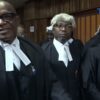The Human right lawyer, Femi Falana, has warn President Muhammadu Buhari not to amend the money laundering law. Falana said the attempt would weaken the fight against corruption. Falana said there had been “serious objections” to certain provisions of the proposed bill. He said this at a workshop on the Roles of Professionals in the Fight against Corruption, organized by the Presidential Advisory Committee on Anti corruption in Abuja on Thursday.
“Instead of addressing the challenges encountered in dealing with the menace of money laundering, the federal government has submitted the Money Laundering (Prevention and Prohibition) Bill, 2016,” he said.
“In view of the serious objections to certain provisions of the proposed Bill by the EFCC, the National Assembly is urged to conduct a public hearing with a view to ensuring that the limited success recorded in the fight against money laundering is not sacrificed on account of expediency.” Mr Falana expressed disappointment that the Nigerian Bar Association (NBA) for their lackluster role in the fight against corruption but praised the Institute of Chartered Accountants of Nigeria for their role on the fight against corruption.
“While (ICAN) has taken a bold and patriotic action towards ensuring that her members comply with the provisions of the Money Laundering Prohibition Act, the (NBA) has strongly resisted the subjection of her members (lawyers) to the anti-money laundering framework enshrined in the MLA (Money Laundering Act),” said Mr. Falana.
“In specific terms, ICAN had commendably issued a compliance document called the ‘ICAN Members Guidance on Money Laundering’ which further explains the provisions of the MLA as it affects Chartered Accountants, the necessity for complying with same and the consequences of non-compliance.
“On its part, the NBA has insisted that lawyers cannot be subjected to certain anti-money laundering provisions and requirements under the MLA. “The NBA’s contention is that legal practitioners have certain duties to their clients which are imposed on them by the Legal Practitioners Act 1975, the Evidence 2011 and the Rules of Professional Conduct for Legal Practitioners 2009.”


















